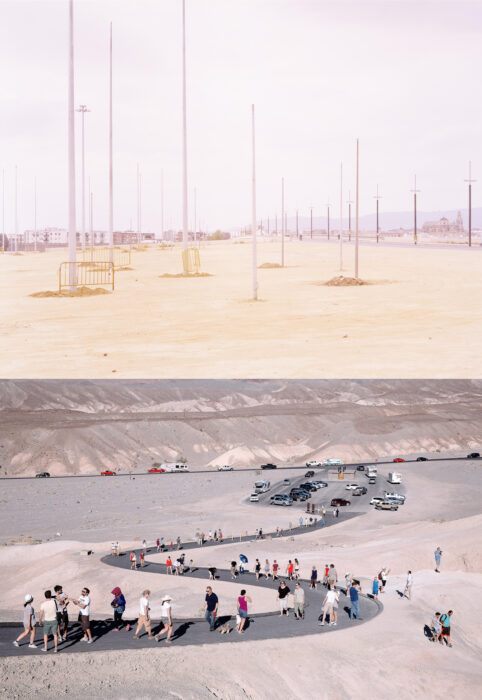In his photographic works, Rainer Zerback (*1958) has been intensively concerned with the theme of civilisation for over thirty years. The title of his solo show RECENT TOPOGRAPHICS refers to the American landscape photography of the “New Topographics”, which emerged in the 1960s and consciously turned against the traditional romanticising landscape photography of the 19th and early 20th centuries. It focused on landscapes that, due to their banality, had not received any photographic attention until then, such as agricultural landscapes, suburban settlements or industrial plants. In contrast, Rainer Zerback’s exhibition RECENT TOPOGRAPHICS once again focuses on the beautiful or even spectacular landscape that is worth seeing. However, these natural landscapes are not untouched by human civilisation, be it through relics of man – sometimes only recognisable at second glance – or through the massive presence of man himself.
In his series “Contemplationes”, Rainer Zerback shows us a deserted world – in quiet, heat-shimmering images without apocalyptic bluster. Through targeted image processing, individual everyday objects come into focus. We only encounter traces of human civilisation: cars, electricity pylons, climbing frames, dwellings of all kinds. What at first gives the impression of peaceful seclusion, at second glance seems irritating and unsettling. It seems as if people had been there only a short time ago.
The second series shows “Places of Interest”. The term comes from travel guides and generally refers to places that are worth a visit. In concrete terms, these are places that are distinguished by their historical or cultural significance or by their scenic beauty and that attract a particularly large number of visitors for this very reason. We see people scurrying like ants through spectacular landscapes or across urban squares.
In juxtaposing these two series, Rainer Zerback presents us with an archaeology of the Anthropocene, as it were, as if we were looking back from a future “world without us”.


In his photographic works, Rainer Zerback (*1958) has been intensively concerned with the theme of civilisation for over thirty years. The title of his solo show RECENT TOPOGRAPHICS refers to the American landscape photography of the “New Topographics”, which emerged in the 1960s and consciously turned against the traditional romanticising landscape photography of the 19th and early 20th centuries. It focused on landscapes that, due to their banality, had not received any photographic attention until then, such as agricultural landscapes, suburban settlements or industrial plants. In contrast, Rainer Zerback’s exhibition RECENT TOPOGRAPHICS once again focuses on the beautiful or even spectacular landscape that is worth seeing. However, these natural landscapes are not untouched by human civilisation, be it through relics of man – sometimes only recognisable at second glance – or through the massive presence of man himself.
In his series “Contemplationes”, Rainer Zerback shows us a deserted world – in quiet, heat-shimmering images without apocalyptic bluster. Through targeted image processing, individual everyday objects come into focus. We only encounter traces of human civilisation: cars, electricity pylons, climbing frames, dwellings of all kinds. What at first gives the impression of peaceful seclusion, at second glance seems irritating and unsettling. It seems as if people had been there only a short time ago.
The second series shows “Places of Interest”. The term comes from travel guides and generally refers to places that are worth a visit. In concrete terms, these are places that are distinguished by their historical or cultural significance or by their scenic beauty and that attract a particularly large number of visitors for this very reason. We see people scurrying like ants through spectacular landscapes or across urban squares.
In juxtaposing these two series, Rainer Zerback presents us with an archaeology of the Anthropocene, as it were, as if we were looking back from a future “world without us”.